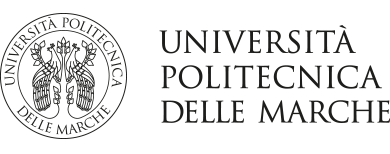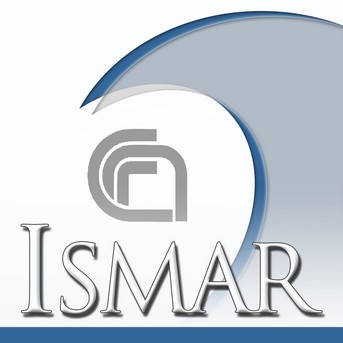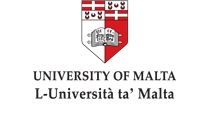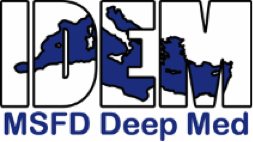The IDEM consortium is composed by 9 partners: Università Politecnia delle Marche (coordinator, UNIVPM, Italy), Consiglio Nazionale delle Ricerche (CNR, Italy), Agencia Estatal Consejo Superior de Investigaciones Cientificas (CSIC, Spain), Department of Fisheries and Marine Research - Ministry of Agriculture, Rural Development and Environment (DFMR, Cyprus), Agenzia Nazionale Nazionale per le Nuove Tecnologie, l’Energia e lo Sviluppo Economico Sostenibile (ENEA, Italy), Institut Français de Research pour l’Exploitation de la Mer (IFREMER, France), Tel Aviv University (TAU, Israel), Universitat de Barcelona (UB, Spain) and University of Malta (UM, Malta).
The partners belong to 6 countries, of which 5 from EU and 1 extra-EU, covering the overall extension of the Mediterranean Sea and its three sub-basins (Wester, Central-Ionian comprising the Adriatic, and the Aegean-Levantine basins).
 Università Politecnica Delle Marche (UNIVPM) - Italy COORDINATOR
Università Politecnica Delle Marche (UNIVPM) - Italy COORDINATOR
The Università Politecnica delle Marche (UNIVPM) is made up of 12 Departments in the technical scientific fields spanning from Engineering, Life Sciences, Agriculture, Economics, Medicine and Surgery. The staff working at UNIVPM consist of about 700 lecturers and researchers, 650 administrative and technical employees. There are about 17.000 enrolled students.
The Department of Life and Environmental Sciences (DiSVA) owns high-qualified laboratories operating in the fields of ecology, marine biology and nature conservation. DiSVA has been established in 2011 and includes personnel from former Departments with consolidated expertise in marine biology and ecology, botany, zoology, microbiology, chemistry, developmental biology and reproduction, algal physiology, geology and sedimentology, paleoceanography, physical oceanography, protection, conservation and restoration of marine environments. DiSVA collaborates with many Centers and Universities all over the world (USA, Canada, Belgium, France, Spain, UK, Germany, Norway, Austria, Greece, Croatia, Indonesia, Vietnam, Madagascar, Singapore, Israel and Japan) in the framework of national and international research projects and networks of excellence.
DiSVA has participated over the last 15 years in more than 20 EU projects and has a wealth of experience in the ecology of benthic communities and marine biogeochemical processes, and in pilot studies on marine restoration practices in temperate and tropical seas. DiSVA carries out research activities worldwide with specific attention on costal (hard and soft bottom) and deep-sea areas, including the Western and Eastern Mediterranean, Atlantic, Pacific, Arctic and Antarctic Ocean and Sub-Antarctic regions.
WEBSITE- http://www.univpm.it
 Consiglio Nazionale Delle Ricerche (CNR ISMAR) - Italy
Consiglio Nazionale Delle Ricerche (CNR ISMAR) - Italy
CNR ISMAR is the main Italian scientific institution devoted to marine sciences. It has a long and documented experience on the multidisciplinary study of deep-sea ecosystems, with special focus on cold water coral and chemosynthetic habitats. In this respect, CNR-ISMAR has a consolidated reputation for seafloor mapping, bio-geological assessment of benthic biodiversity, stratigraphy, sedimentology and oceanography. CNR-ISMAR is also experienced in marine cartography, habitat mapping, GIS and the organization and conduction of complex offshore multidisciplinary oceanographic surveys, within the frame of national and international programmes. CNR-ISMAR owns several facilities such as laboratories for sedimentology and bio-sedimentological analysis. ISMAR is able to share marine geographical data and to offer public access under permission as WebGIS services following OGC standards (WMS, WCS, WFS). ISMAR is contributing in developing a thematic subsystem platform for sea and marine resources in the framework of a national initiative, aiming at designing and developing a multidisciplinary cyber-infrastructure for the management, processing, and evaluation of Earth and Environmental resources –i.e. data, services, model and sensors.
WEBSITE : http://www.ismar.cnr.it/
![]() Agencia Estatal Consejo Superior de Investigaciones Cientificas (CSIC)- Spain
Agencia Estatal Consejo Superior de Investigaciones Cientificas (CSIC)- Spain
The Institute of Environmental Assessment and Water Research (IDAEA) belongs to the Spanish Council for Scientific Research (CSIC). This Institute is devoted to the study of the natural and anthropogenically-induced changes in the marine and continental ecosystems, mainly those involving toxicity increases in organisms and humans, by means of chemical and geochemical techniques. The information contained in the organic and inorganic molecules, including isotopic composition, is investigated for assessment of ecosystem changes, namely in aquatic systems. Analytical methods for the measurement of these molecules, currently at trace amounts, in water, air, soils and sediments are developed.
The Institute is organized in two Departments: Environmental chemistry and Geosciences.
The former is devoted to the study of the origin, transport and evolution of the natural and anthropogenic organic inputs in the environment, including atmosphere, water, soils, sediments and organisms. This task also includes the study of climate change tracers in marine ecosystems. Numerous analytical methods for trace organic compounds, including polar and apolar, volatile and non-volatile compounds by means of gas and liquid chromatography, capillary electrophoresis and mass spectrometry have been developed. The effects of the pollutants on higher organisms, fish, molluscs and humans are also considered, involving the use of advanced biochemical and molecular biology techniques, including genomics and proteomics. The metabolism and toxicity of xenobiotics are studied at different organizative biological levels and in organisms (either vertebrates or invertebrates).
The second is devoted to the study of the origin, transport and evolution of the natural and anthropogenic inorganic inputs in the environment, including atmosphere, surface water and groundwater. This goal includes the control and identification of the sources contributing to atmospheric pollutants (aerosols and other components), the characterization of natural attenuation and remediation of polluted waters, handling strategies for recycling industrial combustion residues, research on surface hydrological processes and erosion, development of numerical methods for fluid flow and reactive transport and urban and civil engineering groundwater hydrology.
The areas of expertise developed within IDAEA are analytical chemistry, geochemistry, molecular biology, toxicology and civil engineering.
As consequence of these activities the institute has about 25 GC-MS and LC-MS instruments with different configurations (quadrupole, triple quadrupole, time of flight, Q-trap), three magnetic high resolution mass spectrometers, one GCxGC-MS system, two ICP-MS, LC-MS Orbitrap and one GC-MS Q-exactive Orbitrap.
The service has implemented several certified ISO methods on oil residues, dioxin and dioxin-like PCB analysis.
WEBSITE : http://www.idaea.csic.es/
Department of Fisheries & Marine Research (DFMR) - Cyprus
The mission of the Department of Fisheries and Marine Research (DFMR) is the sustainable management and development of fisheries and aquaculture and the protection and preservation of the marine environment through an integrated scientific approach.
The vision of the Department is the economic and social prosperity of the fisheries sector in Cyprus, in a clean, healthy and productive marine environment .
DFMR belongs to the Ministry of Agriculture, Rural Development and Environment of the Republic of Cyprus. DFMR is the competent authority for the implementation of the MSFD in Cyprus and has as primary priority the maintenance of the Good Environmental Status (GES) of the marine environment of Cyprus.
Within its subjects of interest the DFMR has developed a significant activity in the field of monitoring and research of the marine environment in the framework of implementation of several European and National laws, as well as International and Regional conventions.
WEBSITE: www.moa.gov.cy/dfmr
![]() Agenzia Nazionale per le Nuove Tecnologie, l'Energia e lo Sviluppo Economico Sostenibile (ENEA) -Italy
Agenzia Nazionale per le Nuove Tecnologie, l'Energia e lo Sviluppo Economico Sostenibile (ENEA) -Italy
The Italian National Agency for New Technologies, Energy and Sustainable Economic Development is the second major Italian research organization, with around 2700 staff employees distributed in its 9 research centers all over the national territory. The Agency’s activities are mainly focused on Energy Efficiency, Renewable Energy Sources, Nuclear Energy, Climate and the Environment, Safety and Health, New Technologies, Electric System Research.
Organized in three main departments (Energy Technologies, Fusion and Technology for Nuclear Safety and Security and Territorial and Production Systems Sustainability Department (SSPT) .
The Department for Sustainability is organized into 6 Divisions and 2 Units: IDEM participants belong to the Division for Protection and Enhancement of the Natural Capital (PROTER, divided in three labs) .The ENEA-Marine Environmental Research Centre (MERC) conducts research and develops methodologies and tools for the protection and sustainable management of the marine environment. MERC is involved in the development of tools/infrastructures for archiving and disseminating data (participation to SEADATACLOUD, ODIP2, EMODNET Data Ingestion and EMODNET Geology, etc.).
MERC is involved in the development of tools/infrastructures for archiving and disseminating data (participation to SEADATACLOUD, ODIP2, EMODNET Data Ingestion and EMODNET Geology, etc.). Studies on biodiversity (including conservation), ecosystem functioning, characterization and management of marine ecosystems, comprising the use of bioindicators for detecting environmental quality, effects of climate change and human impacts on the marine environment
The MERC research topics are: Marine environmental processes and status (from coastal to deep-sea environments); impact on ecosystems and biodiversity (including the deep sea); marine biophysical monitoring
WEBSITE: https://proter.sspt.enea.it/en and https://proter.sspt.enea.it/en/structure/bes
 Institut Français de Recherche pour l'Exploitation de la Mer (IFREMER) -France
Institut Français de Recherche pour l'Exploitation de la Mer (IFREMER) -France
Created in 1984, IFREMER is a governmental / public institution with an exclusively marine vocation. It develops research, expertise and service activities for understanding, predicting, protecting and sustainably managing the ocean resources. For these purposes, it designs and operates observational, experimental and monitoring tools and modelling platforms. It manages the French ocean fleet for the entire scientific community. It comprises 1700 salaried employees. At a national level, IFREMER plays an important role in supporting monitoring (national monitoring networks) and in the implementation processes of both the Water framework Directive and Marine Strategy Framework Directive. Under the responsibility of the Ministry of Ecology, IFREMER especially coordinates the scientific and technical work on monitoring and evaluation of the Good Environmental status within MSFD. IFREMER links with many partner organisations in many countries, supporting then cooperation, focusing on international research and monitoring programmes and on national regional and international environmental management schemes (UNEP/Regional Action Plan on marine Litter, MFSD reduction measures, G7 declaration, etc.)
WEBSITE: http://wwz.ifremer.fr/
Tel Aviv University (TAU) - Israël
In just six decades of existence, Tel Aviv University (TAU) has evolved into Israel's most diversified, and influential institution of higher learning and research. It is Israel's largest and most comprehensive institution of higher learning - is home to over 30,000 students studying in nine faculties and over 125 schools and departments across the spectrum of sciences, humanities and the arts.
The Steinhardt Museum of Natural History, Israel National Center for Biodiversity Studies at TAU maintains 5.5 millions of specimens that record the fauna and flora of the Middle East over the past century. The collections form the basis for the National Research Infrastructure that is used every year by hundreds of scientists, graduate students, and professionals from Israel and the world. Its new building with state of the art laboratories was recently inaugurated.
WEBSITE: http://smnh.tau.ac.il/eng
![]() Universitat de Barcelona (UB) - Spain
Universitat de Barcelona (UB) - Spain
The UB is the principal centre of university research in Spain and has become a European benchmark for research activity, both in terms of the number of research programmes it conducts and the excellence these have achieved.
The Research Group on Marine Geosciences (GRC Marine Geosciences) of the Universitat de Barcelona (UB) was formally established in 1992, and since then it has been recognized as an excellence research group by the autonomous government of Catalonia. The formalization of the research group was the result of earlier works starting in the late 1960’s and early 1970’s in close collaboration between the UB and the Consejo Superior de Investigaciones Científicas (CSIC), also involving foreign institutions such as the Smithsonian Institution and the Lamont-Doherty Geological Observatory in the US, the Université de Perpignan (France) and the Institute of Oceanographic Sciences Deacon Laboratory (United Kingdom), just to cite a few.
The primary objective of GRC Marine Geosciences is gaining and spreading new knowledge on the mechanisms, impacts and records of active processes occurring from the coastal domain to the deep-sea, with special attention to the human influence on the marine ecosystem at large. The Group normally follows the “source to sink” approach when conceiving its research activities. In addition to their scientific value, the outputs of GRC Marine Geosciences are socially relevant in terms of coastal management, marine mineral resources, uses of the seafloor, geohazard assessment, framing of the consequences of climate change, conservation of marine habitats, and ocean governance.
GRC Marine Geosciences uses state-of-the art platforms and technologies including modern oceanographic vessels, underwater vehicles, and analytical and computing facilities. The Group operates the unique CORELAB laboratory for the non-destructive analysis of sediment cores and other geological objects of very different sizes and compositions.
A competent team, made of marine geoscientists, biogeochemists, paleoceanographers, environmental science researchers, physicists, data managers and GIS experts provides the crosscutting disciplinary character GRC Marine Geosciences needs to achieve its goals.
GRC Marine Geosciences secures its funding mostly from national and international competitive calls, in special from the framework programmes of the European Union, and from contracts with private companies, consortia and administration bodies.
WEBSITE: http://www.ub.edu/geomarines/
http://www.ub.edu
 University of Malta (UM) - Malta
University of Malta (UM) - Malta
The University of Malta traces its origins to the founding of the Collegium Melitense in 1592, and was raised to University status by Grand Master Manoel Pinto de Fonseca in 1769. Situated at Msida, it is the highest teaching institution of the Maltese State, having around 11,500 students. The University of Malta is organised into 14 Faculties divided into Departments, as well as a number of Institutes and Centres. The Department of Biology is one of the six departments within the Faculty of Science. There are nine resident academic members of staff at the Department of Biology, who conduct research in a variety of areas ranging from applied biotechnology to ecology. Over the past decade, the Department has developed into a centre of excellence particularly with respect to the marine biological sciences, and a considerable proportion of the research work concerns marine environmental resources, including aspects related to marine pollution and environmental monitoring, benthic ecology (including the deep sea), and fisheries biology.
WEBSITE: https://www.um.edu.mt/science/biology

